
| . . . Topics . . . | . . . Annals/Logs . . . | |
| Responses welcomed |
 |
|
|||||
|
||||||
| . . . 2002-12-14 | ||||||
Flagiography
A flag is not a symbol but a sign.
As sign, the American flag is clear and useful: at post office, embassy, courthouse, and military base, it signals an institution of the federal government of the USA, an entity on which I'm dependent and for whose sign I'm grateful.
Pressed into service as symbol, it stands for so many things that it can hardly be said to "stand" at all. Flails, rather. Citizens steal from the federal government, lie to the federal government, violate federal laws, plot to undermine the federal Bill of Rights, and then with no apparent discomfort wrap themselves in a flag that symbolizes American Free Enterprise, or the American Spirit, or Christian America, or White America.
Symbolically, a flag becomes a bullfighter's cape: a distractor in aid of a kill.
I hate symbols. That's probably why I read poetry.
| . . . 2002-12-15 |
Errata
A reader asked that I:
get down to it bobbersAnd this I did not do.
Another requested:
the body of an americanBut Dos Passos or MacGowan, I knew not which, and so I merely sat and mulled my whiskey straight.
And another would very much like please some:
tahitian vanilla.....But who placed this order I do not know, although I suspect Clarence King.
Yet another informs me:
I spoke to a member of the loyal Naderite opposition in Boulder, and she told me after Allard's win she's focusing on her wedding plans, which involve avoiding all traditions of the "wedding-industrial complex."And I could have suggested she register at Cut Loose and yet the draw came tardily upon my hand.
Josh Lukin testifies:
I thought of your entry on memorable and moving last lines the other day as I read "The Bus Driver Who Wanted to Be God and Other Stories" by Etgar Keret, who Justine Larbalestier thinks is the Kelly Link of Tel Aviv: "I tried to imagine my mother's uterus in the middle of a green, dew-covered field, floating in an ocean full of dolphins and tuna." "Or else, if the broad in the square wouldn't have had a boyfrined in the army and she'd given Tiran her phone number and we'd called Rabin Shalom, then he would have been run over anyway, but at least nobody would have got clobbered." A whole book chock full of heartbreaking final lines.Still, several days hence I have not read Etgar Keret's prose collection nor even his comic book.
And when a final reader tells me of one who
was trying to remember the name of wealthbondage.com, and came up with "The Cruising Politician."I can only wonder at the undeserved bounty of my days and on my head.
Three defenses of Milton, followed by a pleasant thought
| . . . 2002-12-20 |
A mighty Fortean is our God
Our treasured Nashuan correspondent forwards this item from the Telegraph:
An elderly man suffered first- and second-degree burns when his back mysteriously caught fire as he drove on Amherst Road on Wednesday night.The unidentified man smelled smoke and felt a burning sensation on his back about 6 p.m. and pulled over at the intersection of Amherst Road and Davidson Avenue, where he was assisted by a passing motorist, fire officials said.
Neither the man, who was believed to be about 75, nor his car were still aflame when police and fire officials arrived.
He was taken by Merrimack Fire Rescue to St. Joseph Hospital in Nashua, where he was treated for burns over about 9 percent of his back and released.
All three layers of clothing on his back were burned, and the car seat sustained minor damage, said Merrimack Fire Lt. Charles Smith.
Smith said he couldn't recall any similar incidents in Merrimack in the past.
| . . . 2002-12-24 |
 |
The Weeds of Crime: Three Men on a Horse |
Synopses: A sissy in a mutally adoring marriage who's threatened by masculine hostility and a job crisis can solve all his problems by joining a bunch of gangsters.
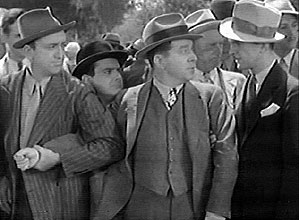 More mugs than you can shake an ugly stick at |
Three Men on a Horse trampled Broadway in 1935, and has been trotted out for summer stock, amateur theatricals, and sit-com rip-offs ever since.
Handed such a slab of certified Grade-A merchandise, Hollywood took the rare and unadvisable step of adapting it closely -- that is, barely.
As with Too Many Girls, there's some documentary interest in getting an unadulterated look at 1930s theater, complete with original cast members, original bathroom and easy virtue gags, and even original sets. But Too Many Girls had Rogers & Hart & lunacy on its side, and it quickly becomes apparent that the art of the legitimate "well-constructed" comedy hasn't declined nearly as much as the art of the musical. The talkies were better than plays pretty much right away. |
Stuck in our expensive seats, we pause for laugh lines, we pause even longer for forced laugh lines, we check our watch when it's time for intermission, and the cinematographer's snore goes almost entirely uninterrupted. (Or, as the IMDB reviewer puts it, "Throw a few special effects in and the movie would be a real winner.")
Well, actors enjoy plays even if cameras don't: Sam Levene is easier to take as a negligent criminal than as his usual negligent cop; worrying about her Erwin "lying in some hospital sick, or the back of some drug store," Carol Hughes ditzes with the best of them (where the best of them, as we'll see, is Una Merkel); Frank McHugh discards his usual cynical-idiot bray for unshakable dignity and becomes a surprisingly touching poet-hero. I didn't know he had it in him.
Nor did I know that Joan Blondell had that voice in her; nor did I want to. (Virtue is easy; accents are hard.) Blondell putting on a fake New York accent is as disturbing as me putting on a fake Groucho nose. It says something about the difference between acting and movie acting that she's the least professional aspect of the film and figures in its only moment of visual interest: a bizarrely interpolated upside-down glamor shot explaining why she's draped across the hero's legs.
And -- "'Cause I'm just crazy about poetry. That's why." -- she also initiates the kind of exchange a guy wouldn't mind on his tombstone:
"You're kind of nice, do you know it, Erwin?" |
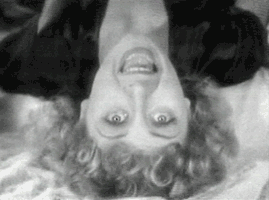 "I'm dizzy, Patsy." |
| . . . 2002-12-26 |
| The Weeds of Crime: |
 |
Baby Face Harrington |
 "Watch me. I'm going to be dynamic. Hey hey!" |
I've never particularly welcomed Butterworth's appearance in a film. He seemed to hobble progress: the camera positioned itself, eager for amusement, waited, faltered, and finally, baffled, moved on. Now I understand the deadlock: Butterworth is as out of place in someone else's movie as a Larry Eigner lyric would be in a paragraph of a techno-thriller, as out of place as an inventor in a Restoration court.
Like his friend Robert Benchley, Butterworth didn't offer a collection of jokes but a critique of consciousness. Where Benchley is driven and betrayed by articulation's social component, Butterworth drifts and dogpaddles into wistfully meditative isolation. Refusing to let go of anything and unable to maintain focus to any conclusion, he clings to blooming buzzing confusion, the material world looming in and out of the fog as idealized promise and as incomprehensible threat. He's certain that a speeding train will let him pass once he's signaled a left turn, and yet he's possibly the only man ever to be physically menaced by Donald Meek.
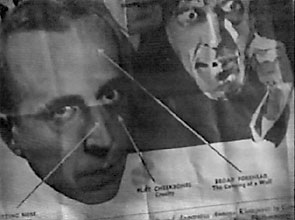 "This fella says I got a split personality." "Oh, you mean a sissy." "No; it's a term used by psychiatrists." |
"I also imitate birds. Purposefully."Similarly, any movie might take pleasure in the sight of Una Merkel with a gun; the scene only becomes Butterworthy as she dreamily begins to use it to smooth her beloved's hair.
Although director Raoul Walsh didn't find this assignment worth mentioning in memoirs or interviews, he soldiers manfully through slow parts good and bad, and although cinematographer Oliver T. Marsh may have thought it a bit of a let-down compared to his other MGM jobs that year (A Tale of Two Cities, David Copperfield, and Lubitsch's The Merry Widow), he provides an appropriately dim look, especially striking in the movie's most extended sequence, a suicide attempt:
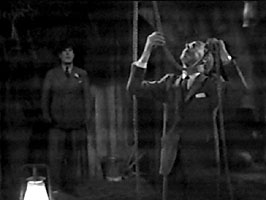 |
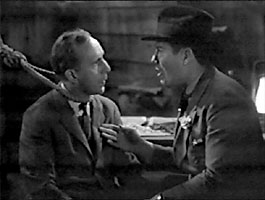 |
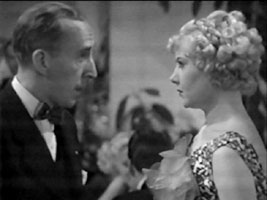 "Would you care to dance?" "If you do." "Well, I do if you do." |
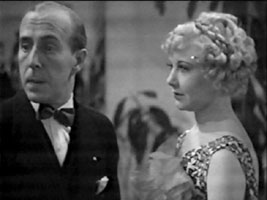 "Well, I do if you -- Willie, do you know you haven't kissed me yet?" "... In front of all these people?" "I will if you will." |
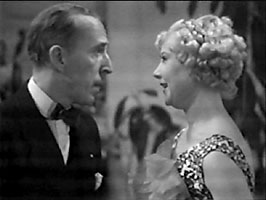 "....... Let's go home." |
A sissy in a mutally adoring marriage who's threatened by masculine hostility and a job crisis can solve all his problems by joining a bunch of gangsters....
Public-minded citizens may wonder at the effect of such a message. Who knows how many crimes were incited and souls degraded before Hollywood finally got around to acknowledging a possible downside to that formula, twenty years later?
| . . . 2002-12-27 |
Two gifts worth returning
Malice in Kulturland from eudaimonía & Reason and Spontaneity from UFO Breakfast.
| . . . 2002-12-29 |
|
| . . . 2003-01-04 |
The Dazzle of Day by Molly Gloss
Molly Gloss is an American who writes about frontiers. This grants her two genres: the western (subgenre: Little House on the Prairie) and science fiction (subgenre: interplanetary colonization). And it grants us a contrast between genre as incitement and genre as marketing.
Some writing lights out for the territory; Gloss's is about the painful thud and roll when you land. Far from fetishizing freedom as an end, Gloss tends to keep any pioneering impulse offstage. Decision making isn't a dramatic climax; it's something you're forced into and then something you deal with. No choice but Hobson's.
Frontiers fascinate Gloss with chanciness and isolation: with their unforeseeable dangers, their backbreaking chores, their lack of a dependable support system. Life is what happens while you're dealing with emergencies. Frontier narratives provide a full lifetime.
Her first novel is one of the better westerns I've read since Elmore Leonard made like Coogan's Bluff (with Carol Emshwiller still tops and with Cormac McCarthy a pony whose one trick is to hoop-la! vomit blood). But The Dazzle of Day partners Gloss's leanings most sympathetically:
Those familiar with the short story venues and literary community of science fiction will recognize Gloss's success in using the tools of the genre. (Le Guin is the standard comparison, but for me Maureen McHugh seems closer.) Those familiar with the commercial market of science fiction won't be surprised by her novel's reception. Genre buyers may thrill at hairsbreadth escapes and respect whitebeard wizards and tolerate Lazarus Long's teeny-bopping, but geriatric pains and unsuccessful rescue missions aren't on their shopping list.
So Magic Realism, ho!
| . . . 2003-01-06 |
Science News
When my feet get sore, or I can't find a parking space, or I knock a champagne flute over, or I fall down the back stairs, or an abandoned mineshaft, I can get pretty irritated with gravity. However, in its defense, it does make it easier to meet people.
| . . . 2003-01-07 |
|
 |
| . . . 2003-01-09 |
Bacalhau, small pond
In New York, he was hot. Now he's not even humid.
| . . . 2003-01-11 |
"Well, guys, we've got to choose"
So asserts the most irritating stop on my regular weblog rounds.
The choices we're offered are a) a government that wastes its time trying to prop up lazy loser crybabies, or b) a government that stands firmly behind responsible highly-cultured hard-working individualists with rich daddies.
Well, guy, you missed one.
At over 900 pages, Rich Democracies is a brick worthy of laying upside your head, but Harold Wilensky's conclusions are easy enough to summarize:
Or they can, when the government tends to anything other than petulance and greed.
Why, I remember a time in America when even the upper-middle-class attended public schools. Nowadays, working couples scramble to top their mortgages and auto loans with high school tuition fees, and have to hope the children will be capable of scrambling for their own crippling debts once they reach college age.
I'm not sure why they didn't teach you this at Princeton.
I can guess, though.
| . . . before . . . | . . . after . . . |